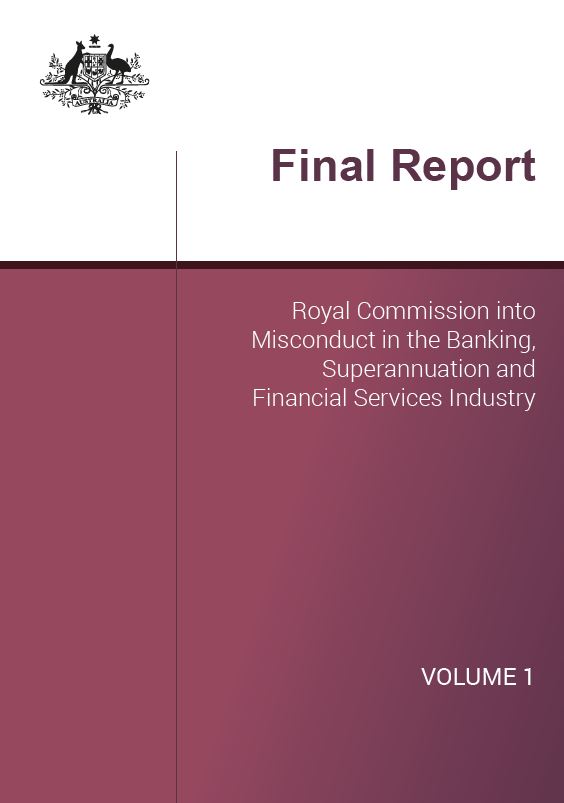As the dust settles following the final Royal Commission Report, its clear that the recommendations have carefully avoided the root cause of the wells of pain which the hearings revealed. In fact the force of evidence from those hearings will be what sits in the memory, not the final report. Perhaps some of this was created by the carefully crafted terms of reference, which made it hard for the Commission to get to root causes; perhaps deliberately?

The report puts the onus on financial institutions and boards to change the culture. Good luck with that, on past experience. Especially if bonus payments are a critical part of remuneration.
Criminal proceedings may follow, and more than 20 institutions are there, but these now are referred back to the very regulators who were found wanting in the first place. And cases though the courts will take years. Will any bankers actually cope it for their illegal behaviour – we doubt it. NAB appears to have been called out for special mention.
ASIC and APRA clearly failed in their respective (if confused) roles and getting greater clarity via a super-regulator may help. But I am not sure the twin peaks model works nor are the regulators sufficiently resourced; and the big missing in action figure is the RBA, who leads the Council of Financial Regulators, along side the Treasury. They drove the debt bubble, and the banks responded. This whole structure is complex, opaque and can be gamed. In the new world, ASIC it seems will have clearer leadership in terms of legal compliance; good luck with that!
Removing commissions from Mortgage Brokers (over time) makes sense as it is clearly a case of conflicted remuneration. And pushing towards a unified best interests duty across mortgage and financial advice makes sense. I still do not know why we have put up with two regimes for so long, it was an accident of history which ASIC should have addressed.
Anti-hawking rules for insurance and superannuation makes sense and should always have been there. SME’s need more protection than they have, but this was not recommended.
The BEAR regime, is centred around compliance, and its extension to insurance and wealth management helps, a little. But the basis of assessment remains narrow and is thus incomplete.
And the big question, which was hooked into the long grass, was structural separation, between product sales and manufacturer; and advice. This to me is a root cause of the conflicts and bad behaviour. Hayne says:
Enforced separation of product and advice would be a very large step to take. It would be both costly and disruptive. I cannot say that the benefits of requiring separation would outweigh the costs, and the Productivity Commission concluded that ‘forced structural separation is not likely to prove an effective regulatory response to competition concerns in the financial system’.
I observe, however, that the Productivity Commission recommended, and I agree, that commencing in 2019, the Australian Competition and Consumer Commission (the ACCC) ‘should undertake 5 yearly market studies on the effect of vertical and horizontal integration in the financial system’.
I am not persuaded that it is necessary to mandate structural separation between product and advice.
Now some entities have already jettisoned wealth management businesses for example, but consumers may well still face inherent and undisclosed conflicts. Our large opaque integrated financial services players remain just that.
Thus bankers can issue a sigh with relief, despite the estimated $6 billion + and counting remediation bill. And I do not see anything here to reverse the tighter lending standards which are now rightly in force, so expect mortgage growth, and home prices to slide further.
But the once in a generation opportunity to fundamentally reform the financial system has been missed, I am afraid, and as a result consumers will continue to pay more than they should for their financial services, big players will still dominate, and regulators will remain pussycats. Not a good outcome in my view.
We will see the Polys mouth words about “consumer trust and protection”, yet in practice do very little. I have a diary card for 5 years from now, for the next review, and one 5 years after that.

I can’t understand the importance of cheating and corruption especially at top level when at the end of the day ……and the lights go out for the last time, you don’t get to take any of your ill gotten gains with you anyway.
On the other hand you can leave a fabulous reputation behind to help guide the next generation.